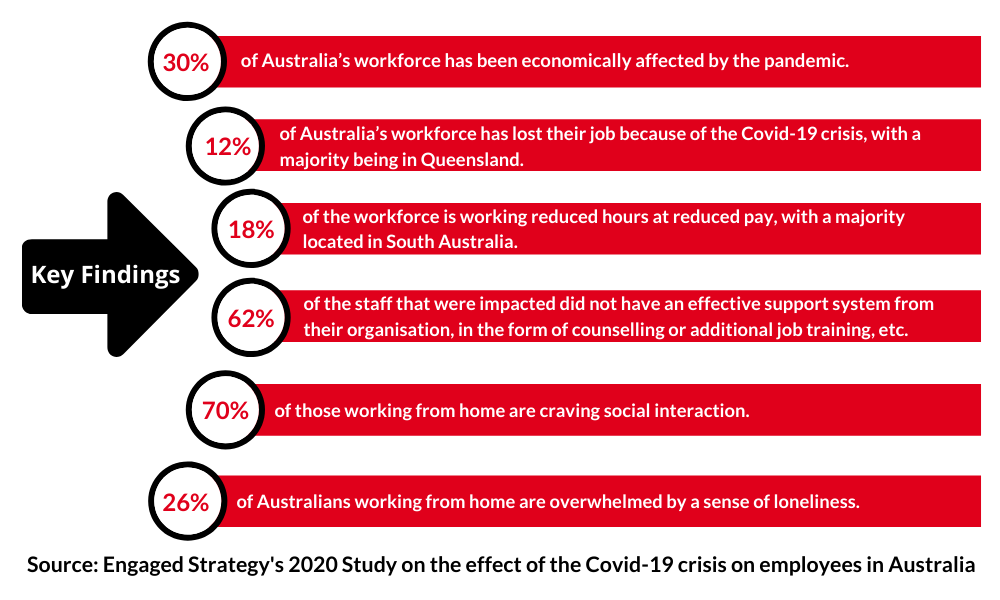Millennials miss the social buzz of an office most, baby boomers and Gen X are most worried about job security and almost one third of Australia's work force face economic hardship as a result of the economic crisis triggered by the COVID-19 pandemic.
That's the findings of a new pulse survey of over 400 Australian workers conducted recently. Fears of a second wave of mental health issues have also been confirmed with the independent survey revealing over 50 per cent are struggling with negative emotions that could impact productivity.
This national survey was conducted from April 14thto April 28th, 2020, by Engaged Strategy, a Queensland-based boutique consulting firm that focusses on helping businesses grow by developing fresh customer, marketing, cultural and organisational strategies.
The poll also revealed that almost one third – 30 per cent of the workforce - were adversely affected by the shattering economic fallout from the lockdown with 12 per cent of respondents saying they lost their job because of Covid-19, while 18 per cent have been working reduced hours at reduced pay. One quarter of the respondents who lost their job belonged to the 45-64 age group and at least 65 per cent of them said they were highly concerned about their future job security.
"What is obvious and very troubling is that organisations that have either laid off their staff or have reduced hours do not seem to be providing an effective support system for their employees," said Christopher Roberts, Managing Director of Engaged Strategy.
"At least 62 per cent of the respondents said they did not receive any assistance in the form of counselling or additional job training. This is almost two out of three people impacted by the pandemic lockdown, which is disturbing to think that so many employers were either unwilling or unable to provide emotional and mental health support or assist their employees," he added.
"Many businesses that are operating at reduced capacity have the prospect of quickly moving to full capacity as restrictions are eased over the next two months. The lockdown period is the perfect opportunity for organisations to treat their staff like an asset, and not just a cost, by investing in skill enhancement, employee engagement and innovation activities," he said.
Mr. Roberts said the survey provided a real insight into some of the struggles that Australia's work force has encountered during the worst global economic crisis since the Great Depression with around 70 per cent of those working from home missing the social interaction with co-workers, and at least 26 per cent said they felt lonely.
This was even more pronounced in the 18-24 age group (Gen Z), where at least 88 per cent said they missed the social interaction, while 47 per cent said they felt lonely. In a telling sign of substandard crisis management and business continuity, only 16 per cent respondents said that they received clear guidelines regarding working from home.

The survey, which only studied those who were employed until the crisis towards March and after, also found that 34 per cent of Australia's workforce feared contracting the virus, which is likely to impact their decision to return to work.
Mr Roberts said prolonged social distancing and government-imposed isolation, coupled with collective grief over the pandemic is having a negative impact on the collective psyche of workers. The stress levels are compounded further with one-third of the workforce – feeling insecure about the future of their employment," he said.
Economic hardships and negative emotions associated with a crisis such as Covid-19 also lowers employee productivity and can result in behavioural and mental health problems.
This has the potential to put further stress on the healthcare system – maybe even as part of a second wave during the road back to recovery - unless organisations immediately identify factors affecting the emotional well-being of their staff and take necessary action to make staff feel safe and secure.
Corrective measures around employee engagement and social interaction by organisations can help boost employee morale and improve productivity even in difficult circumstances – such as relentless and open communication, investments in staff development, providing support, especially to employees impacted either directly or indirectly, surveying staff to understand their concerns, enlist staff to find ways to improve efficiency and engage staff working from home via online social events.
Engaged Strategy's pulse survey analysed employee satisfaction across seven key parameters:
1. Employment status when the impact of the crisis started
2. Effectiveness of communication by employers
3. Effectiveness of crisis handling by employers
4. Emotions and mental wellness in a work from home situation
5. Extent of support provided to staff
6. Fear of job security
7. Fear of contracting Covid-19
To know more about the survey results, write to






